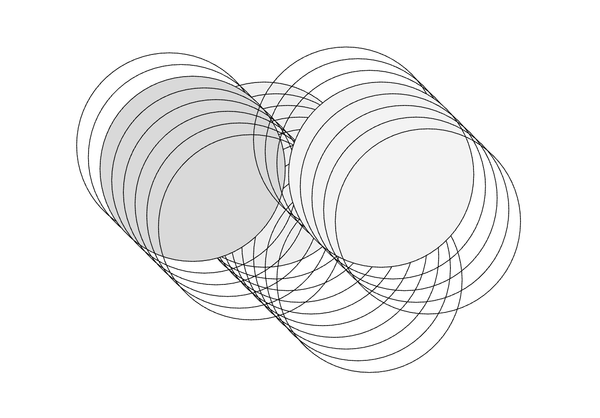Disillusionment is the soil
We have to know why there's been no opposition so that we can build the opposition

I’m writing this in the hour after an anti-health conspiracist has become in charge of the country’s health, in the days after purported advocates of “law and order” have dismissed court orders along with the general role of a judiciary, and in the weeks after anti-government fascists have taken charge of American government. And not much has happened to stop any of it.
To talk about the rare cases of noncompliance, resistance, or protest would only highlight how there are hundreds of millions of people currently standing aside while a handful of people turn the federal government into a private moneymaking scheme disguised as a nationalist purge to take back America. There are certain elements of their strategy responsible for this paralysis – and other ways our media ecosystem has facilitated it – but I want to focus on diagnosing the reasons intrinsic to the (would-be) opposition. In particular, in order to figure out how things get unstuck, it feels necessary to be clear about why the left wing of this country is so clearly demobilized right now.
Based on my observations and conversations with organizers and activists across the progressive left, there are five major reasons that demoralization and disillusionment are rampant among the people who would otherwise be in the vanguard of action against this administration.
1. Trump 1.0 Burnout
From the very first day of the first Trump presidency, America’s Left entered a state of shock and response. The first days and weeks produced massive mobilizations – the Women’s March, mobilizations against the Muslim bans – and the proceeding months catalyzed urgent organizing across immigration, climate, and racial justice (among others). “Unprecedented” didn’t just apply to what Trump was doing to government, it also applied to the numbers and ways that people were showing up to protest and take action. And people made that happen – many with jobs without boundaries, and many more as volunteers. Both the individual and collective nervous system of the activist left was in hypervigilance for four years, long enough to remove some people entirely from future organizing efforts or, at least, to demand a thorough rest and reset.
2. No Biden Reset
Unfortunately, for those that stuck around, the Biden-era provided little space to repower, rest, and build sustainable systems of organizing. Particularly after the energy of the Black Lives Matter rebellion pushed Biden into office, there could have been consolidation of power and policy that would have allowed the progressive left to stand down. Instead, the administration both failed to provide easy wins (like on student debt) and refused to exert any kind of public power to tackle major ongoing crises, like climate. The administration’s signature achievement, the IRA, felt anti-climactic, at best, given the stakes. Perhaps most damning today, it immediately broke almost every campaign promise it had made on immigration policy. Whatever had disappeared in terms of fascist governmental threats, were replaced by an epidemiological one: the full psychic toll of transitioning from the Trump era to the COVID era will probably only be understood decades from now. And any elements of the left that still had the energy to apply pressure on the administration and the Democratic establishment were treated as traitors, and their congressional representatives as targets.
3. Gaza
No part of the Biden administration was as damaging to the relationship between the left wing and the Democratic party as Gaza. If progressives generally support (centrist) Democrats through a calculation that multiplies fractions of political agreement and strategic triage, the absolute moral clarity of Israel’s rampage through Gaza destroyed the equation. You can’t be the good guys while enabling wholesale massacre; you become the villain when you can’t even allow a Palestinian democrat to speak at your convention. While there can be endless litigation of how many votes the Democratic party lost to its position on Gaza, I’m more concerned with the hundreds or thousands of highly-skilled organizers – ones trained up fast through the Trump years – for whom the party’s behavior was an unforgettable sin. Where the right wing has embraced and elevated extremists like Kyle Rittenhouse, the Democratic party dismissed and attacked young people simply asking to bring the party in line with its own professed values.
4. The Biden - Harris Handoff
In the midst of this generational and moral crisis, the Democratic party then decided to stand behind a candidate that it knew was incapable of being a candidate at all. Forced to push him out late in the game, they then anointed an unlikable replacement instead of allowed for a process where the most popular candidate would win. Besides providing a public test of those candidate’s strengths and weaknesses, that process could have produced a resurgence of energy behind some kind of candidate or narrative that could reset the board. Instead, the Biden-Harris handoff doubled-down on what had come before it, and in doing so, affirmed its separation from the activist left.
5. Collaborators instead of Captains
In an anti-incumbent climate, Incumbent Lite is a losing strategy. Anti-authoritarian Lite is then how you lose to a coup. For all the talk of the fate of democracy hanging in the balance, the Biden administration then welcomed Trump to the White House and prepared for an orderly transition and Democrats started talking about where they’d find common ground in Congress. As Trump, Musk, and the GOP have begun to systematically dismantle the government in flagrant violation of constitutional law, judicial orders, and democratic norms, Democratic politicians have complained but done little else. Nevermind a shut down of Congress, we’ve barely had more than press conferences. That has either made their words ring hollow – how can it be that serious? – or their actions laughable. Due to their proximity and access to the current crisis in Washington, they are precisely the people who could demonstrate the stakes now and model the type of outrage and action they would want the rest of the country to do. Instead, they’ve approved nominees. Despite their past failures, authentic opposition by Democratic leaders could prove that this time, at least, they’re going to fight with us and for us, instead of against us. No such inspiration seems forthcoming.
We are not stuck because people are okay with what’s going on.
Instead, any one of these factors could explain why the activist left, in particular, is demobilized. They are compounded by the additional recognition among a much broader public that mass protest is not producing change (more on that here), never mind the efficacy of calling your congressperson: there is a widespread disbelief in the the translation of democratic will into power. People simply don’t believe we can do anything to change what’s happening.
That is an appropriate conclusion from all of these experiences and all of the evidence. The United States is, and has been, a deeply undemocratic democracy, a version of which now also features unmitigated money in politics and a fractured, poisoned public sphere.
But I identify these challenges not to explain inaction, but because action now will require working through and around them. And I’m talking about action, because we have to figure out how to get moving. In a study of 35 cases over 30 years, scholars Jonathan Pinckney and Claire Trilling found that countries that had movements were able to stop democratic backsliding 51.7% of the time – without a movement, the odds were 7.5%. While the power of mass protest to shift particular policy is certainly in question, civil resistance is historically, globally, and demonstrably crucial to stopping authoritarian consolidation. We have to know and popularize this fact.
It is unfortunate that we are faced with that challenge – but it also means that it’s a slightly different one than what we were used to, and it involves different kinds of responses. In many ways, resistance to an authoritarian regime is far simpler than dissent from a democratic one you simply don’t like: many forms of daily life itself become forms of noncompliance, forms of alternative ways of being, forms of protest. I believe that this context is, ironically, better suited to enable widespread action and less susceptible to the hangovers of the factors I above if we recognize its particularities and its possibilities.
Instead of the high capacity and concentrated protest action of Trump 1.0 – and the burnout that produces – we can begin getting unstuck by doing the necessary work of distributing action across everybody and anybody that cares for avoiding disaster, for a healthy and fulfilling life, for a better future democracy.
The exact forms of that action will depend on location and context, but almost everyone will be positioned to do two kinds of things authoritarians hate: (1) inhabiting public space and building solidarity, (2) saying no. Some, like federal workers, will be in critical places to do so, but all of us are connected to some kind of community, employer, or institution that will either collaborate with or reject this administration. All of us get to decide whether we will censor ourselves and deny our own values, or identify ourselves as opponents of illegitimate government and, in doing so, make it easier for others to as well. We can’t wait for elected leaders; we have to lead each other. Ironically, the #Resistance didn’t have terrible much to resist in daily life; now, opportunities abound.
Large and disruptive mobilization will also be necessary, as will politicians who follow our lead, but we are starting from pit of disillusionment that requires us to climb a ladder out. We need small steps accessible to anyone, ones that don’t require faith in or allegiance to the Democratic party. We need little sparks of ideas, creative models compatible with burnout and betrayal. I don’t think it will take much, but it will take something, to show how vastly we outnumber and overpower those terrible, few, small men.



